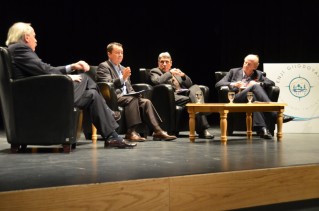Creating conditions for change in Indigenous education

The challenges that face Aboriginal learners as they struggle to close the education gap with non-aboriginal counterparts are legion. But the conditions are right for massive change.
That was the key message at A Call to Innovate, a panel discussion held at Nipissing University on November 3 with Assembly of First Nations National Chief Shawn A-in-chut Atleo, author Dr. John Ralston Saul and Dr. José Barreiro, a Director with the Smithsonian Museum of the American Indian in Washington DC.
"This is where the mind of the country is going,” said Saul. “The problems in Aboriginal education are now a central concern of non-Aboriginal Canadians. This is no longer a marginal issue.”
Saul said a new generation of Aboriginal leaders will lead change, describing these lawyers, judges and educators as the most interesting and engaged thinkers in Canada.
"For too long, Aboriginal people across the Americas have been left out and marginalized,” said Barrerio. But he said that is gradually changing. Through cultural exploration and education, Indigenous people have gained a new curiosity about their place in the world.
"We can bust open the dialogue. When indigenous people have a sense of themselves, fully actualized, they change the discussion,” said Barreiro, a Taino Indian from the Antilles.
Atleo spoke about the historic importance of education in Aboriginal culture and language, sharing stories of learning from his grandmother.
“If education in the past was a tool of disconnection and suppression of language and culture, now it must be the tool of reconnection and reconciliation for First Nations,” said Atleo.
Saul spoke about how PEN International, passed a declaration about linguistic rights. He said 45 Indigenous languages in Canada are at risk of being lost.
“We are obsessed with freedom of expression,” said Saul. “We think we have the ability to speak up without being arrested. But the removal of language, isn’t that the biggest infringement on freedom of expression?”
Panelists also discussed the legislative and financial investments that are required. All shared the perspective that we, as a society, cannot think about the costs of education. We must think about it as an investment that will pay off in future contributions to the economy. Atleo estimates that closing the education gap would mean an added $400 billion to Canada’s economy.
Over 230 people packed Nipissing’s theatre to hear the discussion, which was organized by Nipissing’s Office of Aboriginal Initiatives. It will help Nipissing shape learning strategies moving forward.
All panelists thanked Nipissing for providing a valuable forum to exchange ideas.
“You are providing the type of learning that we need,” said Atleo. “University is not just about providing fuel for the economic engine, we must also support actors to be part of a more civil society.”
